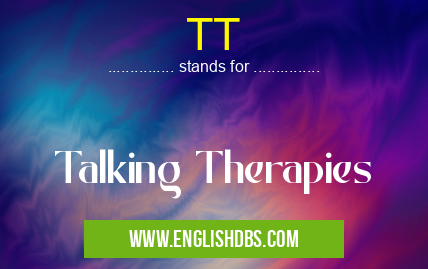What does TT mean in HEALTHCARE
Talking therapies (TT) are a type of psychological treatment used to help people better manage their mental health and emotional wellbeing. They involve talking to a qualified professional, such as a counsellor or psychotherapist, about how you feel and the problems that are causing distress in your life. By talking through your thoughts and feelings in a safe environment, you can gain insight into why you are struggling and learn new coping strategies. Talking therapies can be effective at treating many different mental health issues, including depression, anxiety, stress, trauma, eating disorders and substance misuse.

TT meaning in Healthcare in Medical
TT mostly used in an acronym Healthcare in Category Medical that means Talking Therapies
Shorthand: TT,
Full Form: Talking Therapies
For more information of "Talking Therapies", see the section below.
» Medical » Healthcare
Full Form
The full form of TT is Talking Therapies. This is an umbrella term which refers to the range of psychological treatments that involve talking through your feelings with an experienced practitioner. The therapeutic conversations may focus on helping you find insight into why certain emotions have arisen or encouraging you develop new ways of thinking that will help alleviate distress caused by stressful circumstances or difficult events from the past. Many types of talking therapies exist today – all with differing approaches – but they all aim to teach tools for inner growth or healing while providing emotional support during times of need.
Essential Questions and Answers on Talking Therapies in "MEDICAL»HEALTHCARE"
What is talking therapy?
Talking therapy is a form of psychological therapy commonly used to treat mental health problems such as depression, anxiety, and psycho-social difficulties. It involves talking with a trained therapist who can help you understand your thoughts and feelings better and develop strategies for coping.
How long will I need to attend talking therapy for?
The length of time you’ll need to attend talking therapy can vary depending on the type of problem you’re experiencing, how severe it is and how quickly you are able to make progress. Generally speaking, sessions are usually held weekly or fortnightly over a period of several weeks or months.
Is there evidence that talking therapies work?
Absolutely! Research suggests that talking therapies can be an effective treatment for a wide range of mental health problems including depression and anxiety. A number of studies have also shown that talking therapies can lead to lasting changes in people’s lives by helping them manage their thoughts, emotions, behaviours and moods in healthier ways.
Will I need to take medication as well as attending talking therapy?
Depending on your individual situation, your therapist may suggest taking medication alongside attending therapy sessions in order to manage your symptoms effectively. However, whether or not this is necessary will be based on professional advice from both yourself and your doctor/psychiatrist.
Do I need a referral from my GP in order to access talking therapy?
This depends on where you live and the type of talking therapy you’d like to access. In some locations, such as the UK NHS (National Health Service), referrals are required from GPs before accessing different forms of psychotherapies including Cognitive Behavioural Therapy (CBT). However, in other locations it is sometimes possible to self-refer or access private providers directly without needing a referral from a medical professional.
Can anyone benefit from talking therapies?
Yes! Talking therapies can provide support for any individual who may be struggling with their mental wellbeing including those with diagnosed mental health conditions as well as those facing stressors such as bereavement or relationship difficulties.
What types of issues can be addressed through talking therapies?
Talking therapies can help individuals address many issues which impact their psychological wellbeing ranging from general stressors through life challenges & transitions to more complex clinical diagnostic conditions such as depression & anxiety disorders.
Final Words:
Talking therapies (TT) offer an effective way of managing mental health problems as well as improving emotional wellbeing by providing a safe space to talk through thoughts and feelings with someone who is trained in this field. Different types of therapy can help address different situations; this includes counselling for addressing certain topics within one’s personal life; cognitive behavioral therapy (CBT) for learning how behaviour influences one’s emotions; psychotherapy for exploring longstanding patterns in relationships; group therapy for exploring shared experiences together; among others depending on the individual’s specific needs or situation.
TT also stands for: |
|
| All stands for TT |
